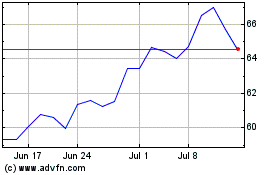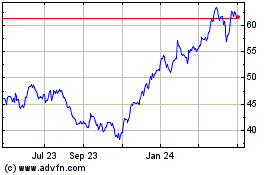Citi To Pay $12.9 Million Related to "Dark Pool" Trading Violations
September 14 2018 - 4:15PM
Dow Jones News
By Micah Maidenberg and Alexander Osipovich
Citigroup Inc. will pay regulators $12.9 million to settle
charges related to its operation of a so-called "dark pool" trading
platform called Citi Match.
The Securities and Exchange Commission said the Citi affiliate
that marketed Citi Match misled users between at least December
2011 and June 2014 by informing them that high-frequency traders
weren't permitted to trade in the pool.
Dark pools are private, off-exchange stock-trading venues that
arrange transactions without broadcasting their users' orders to
the broader market. They are often used by big investors that want
to buy or sell large quantities of shares without tipping off other
market players about their intentions.
Such investors are often wary of letting high-frequency traders
see their orders, out of fear that the traders will infer that a
large buyer or seller is at work. That can cause the speedy trader
to adjust its price quotes in response, resulting in the investor
getting a worse price for its transaction.
In the Citi example, the users of the dark pool, such as mutual
fund and retirement fund advisers, paid what the SEC called a
"relatively high commission rate" that was generally a penny per
share to trade in Citi Match. The Citi affiliate also marketed it
as free from high-frequency traders.
One PowerPoint presentation frequently used to market Citi Match
said "No High Frequency Flow," the SEC said.
However, two high-frequency trading firms accounted for more
than 17% of all transactions by dollar volume in Citi Match during
the period the SEC reviewed, the agency said.
In addition, the affiliate failed to tell customers that nearly
half of orders in Citi Match were routed to and executed in other
trading venues, like other dark pools. Some customers received
notices saying trades were made in Citi Match when they weren't,
according to the SEC.
"All trading venues, regardless of their trade volume, must
ensure that their users have accurate information, particularly
about key issues like order routing," Joseph Sansone, chief of the
SEC Enforcement Division's Market Abuse Unit, said in prepared
remarks.
The agency also found a different Citi affiliate that operated
Citi Match failed to register as a national securities
exchange.
Citigroup agreed to the settlement without admitting or denying
the SEC's findings. A spokeswoman for Citigroup said the company
was pleased to have the matter resolved.
In addition, the bank's affiliates involved in the matter were
both censured by the agency.
The Citigroup settlement is a latest in a string of SEC
penalties related to banks' dark pools and dealings with ultrafast
traders.
In June, Bank of America Merrill Lynch agreed to pay $42 million
to settle SEC allegations that it sent clients' orders to
high-speed traders while telling the clients that it was handling
the orders internally. Bank of America admitted violations of
federal securities laws as part of the settlement, which followed a
similar settlement between the bank and New York's attorney general
in March.
The SEC approved new rules in July aimed at forcing dark pools
to be more transparent about their practices.
Write to Micah Maidenberg at micah.maidenberg@wsj.com and
Alexander Osipovich at alexander.osipovich@dowjones.com
(END) Dow Jones Newswires
September 14, 2018 16:00 ET (20:00 GMT)
Copyright (c) 2018 Dow Jones & Company, Inc.
Citigroup (NYSE:C)
Historical Stock Chart
From Apr 2024 to May 2024

Citigroup (NYSE:C)
Historical Stock Chart
From May 2023 to May 2024
